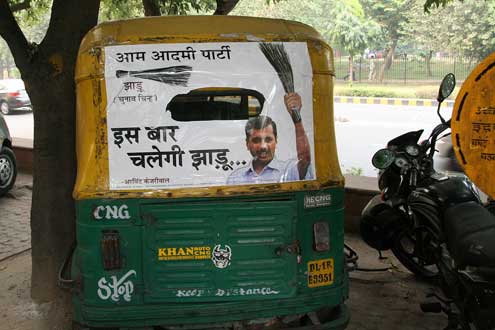After only 49 days in government, Arvind Kejriwal, Delhi’s chief minister, dramatically resigned last week. His announcement came after the Aam Aadmi Party (AAP) was unable to introduce the anti-corruption Jan Lokpal Bill in the Delhi Assembly. The bill was blocked by members of the Congress and Bharatiya Janta Party (BJP), who argued that it had to be approved by the central government. Addressing a crowd of AAP supporters, Kejriwal lashed out at both national parties and argued that the AAP had little choice as fighting corruption and introducing the Lokpal Bill had been the party’s main election plank.
Since its stunning performance in the Delhi elections late last year, the AAP has rarely been out of the news. Within weeks of assuming political office, the AAP subsidized water and electricity for urban households, cancelled foreign direct investment (FDI) in Delhi’s retail market, and set up an anti-corruption helpline. Driving to work each day, I had grown accustomed to hearing Arvind Kejriwal on the radio encouraging Delhiites to use their mobile phones to conduct “sting operations” to catch corrupt officials. Additionally, the AAP ordered investigative probes into the Commonwealth Games and alleged scams concerning the Delhi Jal Board (Delhi Water Board). In keeping with its promise to bring government closer to the people, the AAP organized “Mohalla Sabhas” or neighborhood meetings to encourage citizens to discuss local issues and play a key role in decision-making.
The party also courted a fair share of controversy in its limited time in office. The night raid in Delhi last month by the city’s law minister, Somnath Bharti, which led to the illegal arrest of Ugandan women for their alleged involvement in drug and prostitution ring, was met with intense criticism from women’s rights’ activists. Less than a week later, the AAP took to the streets in a highly publicized dharna (protest) against the Delhi Police. The protest brought large parts of the city to a standstill, inconveniencing thousands of commuters as select Delhi Metro stations were closed temporarily. More recently, the AAP filed a first information report (FIR) against one of the giants of Indian industry, Reliance Industries’ chief Mukesh Ambani, for his alleged involvement in hiking gas prices. These and other incidents have caused many to question the party’s disruptive and often theatrical style of politics.
Public and media reaction to Kejriwal’s resignation has been strong. Many AAP supporters have expressed disappointment over the fact that the AAP quit on the issue of a single bill when they had a larger mandate to fulfill. The party’s harshest critics on the other hand see it as a politically shrewd and calculated move by AAP leaders to evade growing questions about the party’s ability to govern, while simultaneously giving the party greater national visibility in the run up to the general elections in May this year. In an interview to news channel NDTV, Kejriwal denied this allegation, saying that the party’s resignation was a message to voters on their commitment to fighting corruption.
As of this week, Delhi has been brought under President’s Rule with the Delhi Assembly in suspended animation. With general elections only months away, India’s national and regional political parties are ramping up their campaigns and the AAP is not far behind. On Sunday, the AAP announced its first list of 20 candidates for the Lok Sabha elections. In what promises to a be a David versus Goliath contest, the AAP has fielded relatively unknown candidates against political heavy weights such as Congress vice president, Rahul Gandhi, incumbent Congress ministers Kapil Sibal, Salman Khurshid, Manish Tewari, and the BJP leader Nitin Gadkari, to name a few. In media interviews, Kejriwal has enigmatically denied any personal interest in standing for elections, however with the Congress expected to perform poorly, the 2014 polls are already being projected as a two-way contest between BJP prime ministerial candidate Narendra Modi and AAP’s Kejriwal. To date the AAP’s appeal has been confined to Delhi, but in recent months the party has ramped up its efforts to raise funding and support in different parts of the country.
Responding to critics, Arvind Kejriwal has said that the AAP has done more in Delhi over the last two months than previous governments have done in years. It is one of the few parties in India’s political spectrum to eschew corporate funding and rely entirely on public donations to fund its electoral campaign. He has gone on record to say that corruption in Delhi has been reduced as a result of his party’s efforts. While history will decide whether these claims are true, one thing is for sure – the AAP’s 49-day rule in Delhi gave people a glimpse of an alternative, and often controversial, style of politics and governance.
Mandakini Devasher Surie is The Asia Foundation’s senior program officer in India. She can be reached at mandakini.surie@asiafoundation.org. The views and opinions expressed here are those of the individual author and not those of The Asia Foundation.
Source: AsiaFoundation










